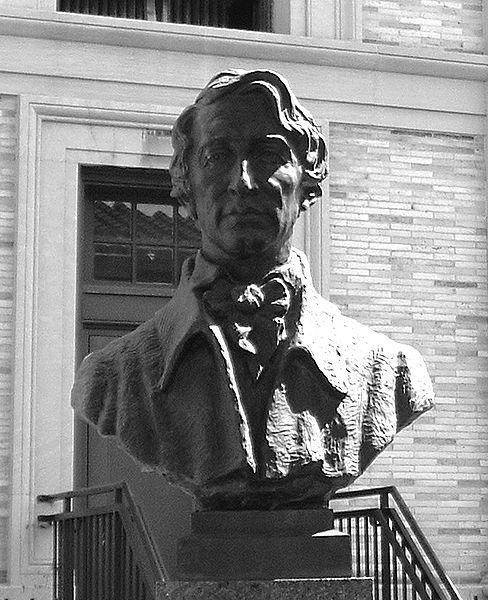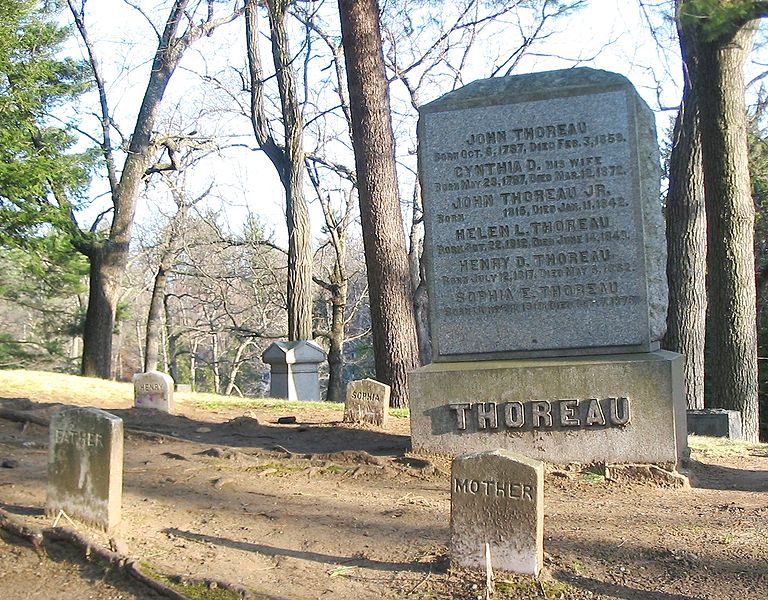<Back to Index>
- Philosopher Henry David Thoreau, 1817
- Potter Josiah Wedgwood, 1730
- Prince of Monaco Louis II, 1870
PAGE SPONSOR
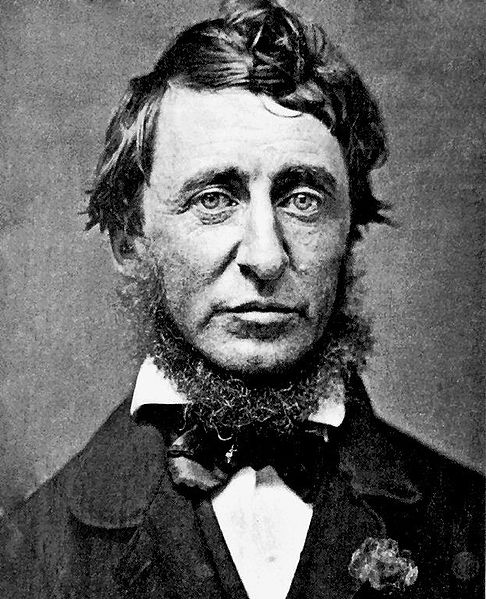
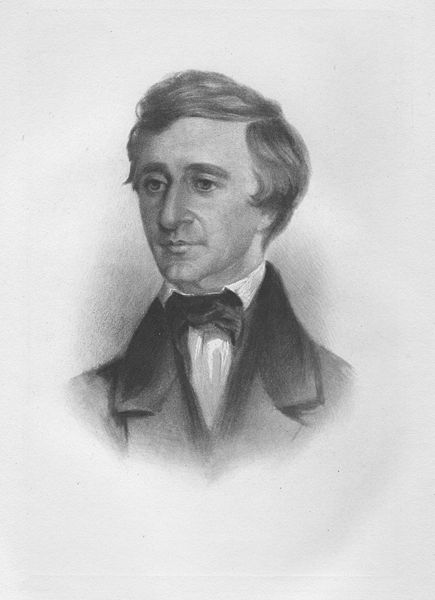
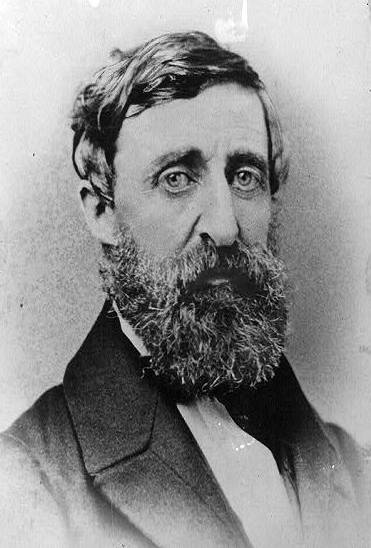
Henry David Thoreau (born David Henry Thoreau; July 12, 1817 – May 6, 1862) was an American author, poet, abolitionist, naturalist, tax resister, development critic, surveyor, historian, philosopher, and leading transcendentalist. He is best known for his book Walden, a reflection upon simple living in natural surroundings, and his essay, Civil Disobedience, an argument for individual resistance to civil government in moral opposition to an unjust state.
Thoreau's books, articles, essays, journals, and poetry total over 20 volumes. Among his lasting contributions were his writings on natural history and philosophy, where he anticipated the methods and findings of ecology and environmental history, two sources of modern day environmentalism. His literary style interweaves close natural observation, personal experience, pointed rhetoric, symbolic meanings, and historical lore; while displaying a poetic sensibility, philosophical austerity, and "Yankee" love of practical detail. He was also deeply interested in the idea of survival in the face of hostile elements, historical change, and natural decay; at the same time imploring one to abandon waste and illusion in order to discover life's true essential needs. He was a lifelong abolitionist, delivering lectures that attacked the Fugitive Slave Law while praising the writings of Wendell Phillips and defending abolitionist John Brown. Thoreau's philosophy of civil disobedience influenced the political thoughts and actions of such later figures as Leo Tolstoy, Mahatma Gandhi, and Martin Luther King, Jr. Thoreau is sometimes cited as an individualist anarchist. Though Civil Disobedience seems to call for improving rather than abolishing government – "I ask for, not at once no government, but at once a better government" – the direction of this improvement aims at anarchism: "'That government is best which governs not at all;' and when men are prepared for it, that will be the kind of government which they will have." Richard Drinnon partly blames Thoreau for the ambiguity, noting that Thoreau's "sly satire, his liking for wide margins for his writing, and his fondness for paradox provided ammunition for widely divergent interpretations of 'Civil Disobedience.'" He further points out that although Thoreau writes that he only wants "at once" a better government, that does not rule out the possibility that a little later he might favor no government.
He was born David Henry Thoreau in Concord, Massachusetts, to John Thoreau (a pencil maker) and Cynthia Dunbar. His paternal grandfather was of French origin and was born in Jersey. His maternal grandfather, Asa Dunbar, led Harvard's 1766 student "Butter Rebellion", the first recorded student protest in the Colonies. David
Henry was named after a recently deceased paternal uncle, David
Thoreau. He did not become "Henry David" until after college, although
he never petitioned to make a legal name change. He had two older siblings, Helen and John Jr., and a younger sister, Sophia. Thoreau's birthplace still
exists on Virginia Road in Concord and is currently the focus of
preservation efforts. The house is original, but it now stands about
100 yards away from its first site. Amos Bronson Alcott and
Thoreau's aunt each wrote that "Thoreau" is pronounced like the word
"thorough", whose standard American pronunciation rhymes with "furrow". Edward Emerson wrote that the name should be pronounced "Thó-row, the h sounded, and accent on the first syllable." In appearance he was homely, with a nose that he called "my most prominent feature." Of his face, Nathaniel Hawthorne wrote:
"[Thoreau] is as ugly as sin, long nosed, queer mouthed, and with
uncouth and rustic, though courteous manners, corresponding very well
with such an exterior. But his ugliness is of an honest and agreeable
fashion, and becomes him much better than beauty." Thoreau also wore a neck beard for many years, which he insisted many women found attractive. However, Louisa May Alcott mentioned to Ralph Waldo Emerson that Thoreau's facial hair "will most assuredly deflect amorous advances and preserve the man's virtue in perpetuity." Thoreau studied at Harvard University between 1833 and 1837. He lived in Hollis Hall and took courses in rhetoric,
classics, philosophy, mathematics, and science. A legend proposes that
Thoreau refused to pay the five dollar fee for a Harvard diploma. In
fact, the master's degree he declined to purchase had no academic merit: Harvard College offered
it to graduates "who proved their physical worth by being alive three
years after graduating, and their saving, earning, or inheriting
quality or condition by having Five Dollars to give the college." His comment was: "Let every sheep keep its own skin", a reference to the tradition of diplomas being written on sheepskin vellum. The traditional professions open to college graduates — law, the church, business, medicine — failed to interest Thoreau, so in 1835 he took a leave of absence from Harvard, during which he taught school in Canton, Massachusetts.
After he graduated in 1837, he joined the faculty of the Concord public
school, but resigned after a few weeks rather than administer corporal punishment. He and his brother John then opened a grammar school in Concord in 1838 called Concord Academy. They
introduced several progressive concepts, including nature walks and
visits to local shops and businesses. The school ended when John became
fatally ill from tetanus in 1842 after cutting himself while shaving. He died in his brother Henry's arms. Upon graduation Thoreau returned home to Concord, where he met Ralph Waldo Emerson.
Emerson took a paternal and at times patronizing interest in Thoreau,
advising the young man and introducing him to a circle of local writers
and thinkers, including Ellery Channing, Margaret Fuller, Bronson Alcott, Nathaniel Hawthorne and his son Julian Hawthorne, who was a boy at the time. Emerson urged Thoreau to contribute essays and poems to a quarterly periodical, The Dial, and Emerson lobbied editor Margaret Fuller to publish those writings. Thoreau's first essay published there was Aulus Persius Flaccus, an essay on the playwright of the same name, published in The Dial in July 1840. It
consisted of revised passages from his journal, which he had begun
keeping at Emerson's suggestion. The first journal entry on October 22,
1837, reads, "'What are you doing now?' he asked. 'Do you keep a
journal?' So I make my first entry to-day." Thoreau was a philosopher of nature and its relation to the human condition. In his early years he followed Transcendentalism, a loose and eclectic idealist philosophy
advocated by Emerson, Fuller, and Alcott. They held that an ideal
spiritual state transcends, or goes beyond, the physical and empirical,
and that one achieves that insight via personal intuition rather than
religious doctrine. In their view, Nature is the outward sign of inward
spirit, expressing the "radical correspondence of visible things and
human thoughts," as Emerson wrote in Nature (1836). On April 18, 1841, Thoreau moved into the Emerson house. There,
from 1841 – 1844, he served as the children's tutor, editorial
assistant, and repair man/gardener. For a few months in 1843, he moved
to the home
of William Emerson on Staten Island, and
tutored the family sons while seeking contacts among literary men and
journalists in the city who might help publish his writings, including his future literary representative Horace Greeley. Thoreau returned to Concord and worked in his family's pencil factory, which he continued to do for most of his adult life. He rediscovered the process to make a good pencil out of inferior graphite by using clay as the binder; this invention improved upon graphite found in New Hampshire and
bought in 1821 by relative Charles Dunbar. (The process of mixing
graphite and clay, known as the Conté process, was patented by Nicolas-Jacques Conté in 1795). His other source had been Tantiusques, an Indian operated mine in Sturbridge, Massachusetts. Later, Thoreau converted the factory to produce plumbago (graphite), which was used to ink typesetting machines. Once
back in Concord, Thoreau went through a restless period. In April 1844
he and his friend Edward Hoar accidentally set a fire that consumed 300 acres (1.2 km2) of Walden Woods. He
spoke often of finding a farm to buy or lease, which he felt would give
him a means to support himself while also providing enough solitude to
write his first book. Thoreau
needed to concentrate and get himself working more on his writing. In
March 1845, Ellery Channing told Thoreau, "Go out upon that, build
yourself a hut, & there begin the grand process of devouring
yourself alive. I see no other alternative, no other hope for you." Two months later, Thoreau embarked on a two year experiment in simple living on July 4, 1845, when he moved to a small, self built house on land owned by Emerson in a second growth forest around the shores of Walden Pond. The house was in "a pretty pasture and woodlot" of 14 acres (57,000 m2) that Emerson had bought, 1.5 miles (2.4 km) from his family home. On July 24 or July 25, 1846, Thoreau ran into the local tax collector, Sam Staples, who asked him to pay six years of delinquent poll taxes. Thoreau refused because of his opposition to the Mexican - American War and slavery,
and he spent a night in jail because of this refusal. (The next day
Thoreau was freed, against his wishes, when his aunt paid his taxes.)
The experience had a strong impact on Thoreau. In January and February
1848, he delivered lectures on "The Rights and Duties of the Individual
in relation to Government" explaining his tax resistance at the Concord Lyceum. Bronson Alcott attended the lecture, writing in his journal on January 26: Thoreau revised the lecture into an essay entitled Resistance to Civil Government (also known as Civil Disobedience). In May 1849 it was published by Elizabeth Peabody in the Aesthetic Papers. Thoreau had taken up a version of Percy Shelley's principle in the political poem The Mask of Anarchy (1819),
that Shelley begins with the powerful images of the unjust forms of
authority of his time – and then imagines the stirrings of a
radically new form of social action. At Walden Pond, he completed a first draft of A Week on the Concord and Merrimack Rivers, an elegy to his brother, John, that described their 1839 trip to the White Mountains.
Thoreau did not find a publisher for this book and instead printed
1,000 copies at his own expense, though fewer than 300 were sold. Thoreau self-published on the advice of Emerson, using Emerson's own publisher, Munroe, who did little to publicize the book. In August 1846, Thoreau briefly left Walden to make a trip to Mount Katahdin in Maine, a journey later recorded in "Ktaadn," the first part of The Maine Woods. Thoreau left Walden Pond on September 6, 1847. At
Emerson's request, he immediately moved back into the Emerson house to
help Lidian manage the household while her husband was on an extended
trip to Europe. Over
several years, he worked to pay off his debts and also continuously
revised his manuscript for what, in 1854, he would publish as Walden, or Life in the Woods,
recounting the two years, two months, and two days he had spent at
Walden Pond. The book compresses that time into a single calendar year,
using the passage of four seasons to symbolize human development. Part memoir and part spiritual quest, Walden at
first won few admirers, but later critics have regarded it as a classic
American work that explores natural simplicity, harmony, and beauty as
models for just social and cultural conditions. American poet Robert Frost wrote of Thoreau, "In one book ... he surpasses everything we have had in America." John Updike wrote in 2004, Thoreau
moved out of Emerson's house in July 1848 and stayed at a home on
Belknap Street nearby. In 1850, he and his family moved into a home at 255 Main Street; he stayed there until his death. In 1851, Thoreau became increasingly fascinated with natural history and travel/expedition narratives. He read avidly on botany and often wrote observations on this topic into his journal. He admired William Bartram, and Charles Darwin's Voyage of the Beagle.
He kept detailed observations on Concord's nature lore, recording
everything from how the fruit ripened over time to the fluctuating
depths of Walden Pond and the days certain birds migrated. The point of
this task was to "anticipate" the seasons of nature, in his words. He
became a land surveyor and continued to write increasingly detailed
natural history observations about the 26 square miles (67 km2) township in his journal, a two million word document he kept for
24 years. He also kept a series of notebooks, and these
observations became the source for Thoreau's late natural history
writings, such as Autumnal Tints, The Succession of Trees, and Wild Apples, an essay lamenting the destruction of indigenous and wild apple species. Until the 1970s, literary critics dismissed Thoreau's late pursuits as amateur science and philosophy. With the rise of environmental history and ecocriticism, several new readings of
this matter began to emerge, showing Thoreau to be both a philosopher
and an analyst of ecological patterns in fields and woodlots. For
instance, his late essay, "The Succession of Forest Trees," shows that
he used experimentation and analysis to explain how forests regenerate
after fire or human destruction, through dispersal by seed bearing winds or animals. He traveled to Quebec once, Cape Cod four times, and Maine three times; these landscapes inspired his "excursion" books, A Yankee in Canada, Cape Cod, and The Maine Woods, in which travel itineraries frame his thoughts about geography, history and philosophy. Other travels took him southwest to Philadelphia and New York City in 1854, and west across the Great Lakes region in 1861, visiting Niagara Falls, Detroit, Chicago, Milwaukee, St. Paul and Mackinac Island. Although
provincial in his physical travels, he was extraordinarily well read
and vicariously a world traveler. He obsessively devoured all the
first hand travel accounts available in his day, at a time when the
last unmapped regions of the earth were being explored. He read
Magellan and Cook, the arctic explorers Franklin, Mackenzie and Parry,
Darwin's account of his voyage on the Beagle, Livingstone and Burton on
Africa, Lewis and Clark; and hundreds of lesser known works by
explorers and literate travelers. Astonishing
amounts of global reading fed his endless curiosity about the peoples,
cultures, religions and natural history of the world, and left its
traces as commentaries in his voluminous journals. He processed
everything he read, in the local laboratory of his Concord experience.
Among his famous aphorisms is his advice to "live at home like a
traveler." After John Brown's raid on Harpers Ferry,
many prominent voices in the abolitionist movement distanced themselves
from Brown, or damned him with faint praise. Thoreau was disgusted by
this, and he composed a speech – A Plea for Captain John Brown –
which was uncompromising in its defense of Brown and his actions.
Thoreau's speech proved persuasive: first the abolitionist movement
began to accept Brown as a martyr, and by the time of the American Civil War entire armies of the North were literally singing Brown's praises. As a contemporary biographer of John Brown put it: "If, as Alfred Kazin suggests,
without John Brown there would have been no Civil War, we would add
that without the Concord Transcendentalists, John Brown would have had
little cultural impact." Thoreau contracted tuberculosis in
1835 and suffered from it sporadically afterwards. In 1859, following a
late night excursion to count the rings of tree stumps during a rain
storm, he became ill with bronchitis.
His health declined over three years with brief periods of remission,
until he eventually became bedridden. Recognizing the terminal nature
of his disease, Thoreau spent his last years revising and editing his
unpublished works, particularly The Maine Woods and Excursions, and petitioning publishers to print revised editions of A Week and Walden.
He also wrote letters and journal entries until he became too weak to
continue. His friends were alarmed at his diminished appearance and
were fascinated by his tranquil acceptance of death. When his aunt
Louisa asked him in his last weeks if he had made his peace with God,
Thoreau responded: "I did not know we had ever quarreled." Aware he was dying, Thoreau's last words were "Now comes good sailing", followed by two lone words, "moose" and "Indian". He
died on May 6, 1862 at age 44. Bronson Alcott planned the service and
read selections from Thoreau's works, and Channing presented a hymn. Emerson wrote the eulogy spoken at his funeral. Originally buried in the Dunbar family plot, he and members of his immediate family were eventually moved to Sleepy Hollow Cemetery in Concord, Massachusetts.
“ I
went to the woods because I wished to live deliberately, to front only
the essential facts of life, and see if I could not learn what it had
to teach, and not, when I came to die, discover that I had not lived. I
did not wish to live what was not life, living is so dear; nor did I
wish to practise resignation, unless it was quite necessary. I wanted
to live deep and suck out all the marrow of life, to live so sturdily
and Spartan-like as to put to rout all that was not life, to cut a
broad swath and shave close, to drive life into a corner, and reduce it
to its lowest terms, and, if it proved to be mean, why then to get the
whole and genuine meanness of it, and publish its meanness to the
world; or if it were sublime, to know it by experience, and be able to
give a true account of it in my next excursion. ” “ A
century and a half after its publication, Walden has become such a
totem of the back-to-nature, preservationist, anti business,
civil disobedience mindset, and Thoreau so vivid a protester, so
perfect a crank and hermit saint, that the book risks being as revered
and unread as the Bible. ”
